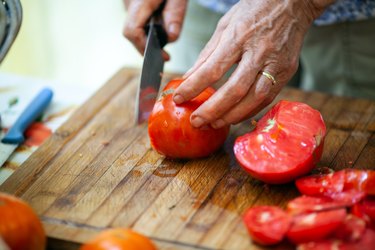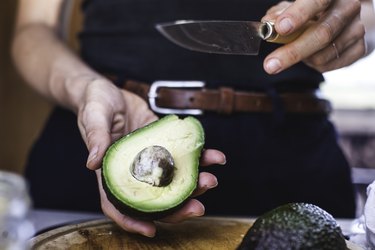
Quick chemistry lesson: "Fruits and vegetables go through a ripening process — from unripe to ripe to too ripe to past the point of appeal. One way this happens is by ethylene gas," says Mary Angela Miller RDN, LD, aka The Food Safety Dietitian.
"Like most gases, you can't see or smell ethylene, but it activates the enzymes in fruit that cause ripening. This breaks down cell structures. And when this happens, they become softer and eventually squishy." This is when foods begin to spoil.
Video of the Day
Video of the Day
The thing is, some produce is known as "ethylene producers" and others as "ethylene sensitive" — so to delay ripening, we should avoid storing the two near each other if possible.
Basic Refrigeration and Storage Tips
Miller shares her top storage tips for keeping your fruits and veggies fresher for longer:
- You may get a few extra days by storing gas producers from gas-sensitive foods in separate crisper drawers. "I admit I've always used these drawers to separate based on odor," she says, adding, "I keep my lemons in one drawer and my onions in another. There are all sorts of great flavored iced teas, but onion isn't one of them!"
- In general, ethylene producers should go in a low-humidity drawer, with an open vent, so the gas is not contained within the drawer.
- Gas-sensitive foods might do better in a high-humidity, closed-vent drawer.
- Use original containers, which allows air to circulate.
1. Corn
Technically speaking, corn is more of a hybrid food — it's both a whole grain (yes, really) and a vegetable, according to the Whole Grains Council — so we're including fresh corn here since you shop for it in the produce section.
Corn is unique from most other fruits and vegetables because it doesn't produce ethylene, nor is it sensitive to the gas, Miller tells us.
That said, "fresh corn on the cob only lasts in the fridge for up to three days," says Toby Amidor, RD, CDN, FAND, best-selling author of The Create-Your-Plate Diabetes Cookbook. "Then, it can be cooked and refrigerated for between three to five days. If you are not eating it immediately, you can freeze it for up to two months."
Corn Recipes to Try
2. Tomatoes
For most produce, you can avoid early spoilage by keeping it in the refrigerator — the exception being tomatoes.
"Tomatoes should be stored at room temperature. Avoid storing them in the fridge, which will make them spoil quicker and can make them mealy. Keep tomatoes loose in a bowl away from the sun or heat (like from the stove)."
According to Miller, tomatoes are ethylene producers, so keep them away from ethylene-sensitive foods you might also keep on the counter like oranges.
Tomato Recipes to Try
3. Figs
Figs are great to have on hand because they go well in both sweet and savory dishes, making them super versatile. The trouble is, fresh figs are pretty delicate, so they only last one to two days in the fridge, according to Miller.
They also produce ethylene, so avoid storing them near the leafy greens or broccoli. Figs typically come in a plastic container, which is perfect for storing because it allows for ventilation.
Fig Recipes to Try

4. Avocado
There's no shortage of "over-ripened" avocado memes, which just goes to show that a) we love our avocados and b) they can be kind of finicky when it comes to spoiling.
Amidor shares a simple tip on how to store avocados so that you don't miss their peak ripeness: Avocados can ripen on the counter but they should be stored away from ethylene-producing fruits such as bananas, apples and melon, which will ripen them much quicker.
Once they are ripe, the can be stored unopened in the refrigerator for an additional few days. Purchase underripe avocados if you want them to last a bit longer.
Avocado Recipes to Try
5. Berries
Berries are tricky because, they're "delicate," as Miller puts it, which makes them perishable. This is why berries typically last two to five days, depending on the berry.
Their actual structure isn't strong — they have soft cell walls. Berries also have a high moisture content and a bunch of tiny crevices for moisture to accumulate. Plus, they're sensitive to ethylene. All of this combined makes them delicate and highly perishable.
"Berries tend to spoil quicker with mold if they are washed before storing in the refrigerator. Instead, wash only before eating/using and store, unwashed, in a dry, covered container," Amidor stresses.
Another option is to freeze berries in a single layer on baking sheets and then store in a bag frozen for up to six months. This is a good solution when you think you won't eat them before they go bad.
Berry Recipes to Try
6. Leafy Greens
Romaine, mixed spring, spinach and other leafy greens are all sensitive to ethylene gas, so you'll want to store them in the fridge away from produce that produces ethylene such as figs, kiwi and peaches so that they'll last longer.
Another storage tip: Add a piece of paper towel to the bag or plastic container holding your leafy greens. This will help absorb extra moisture, keeping the greens from getting slimy and prolonging their shelf-life beyond the typical three to five days.
Leafy Green Recipes to Try

7. Asparagus
Asparagus is sensitive to ethylene. So like berries and leafy greens, keep them separate from gas-producing produce when you're storing them in the refrigerator, Miller says.
They typically keep for up to three days. To help keep them fresh, store them with a wet paper towel wrapped around the stem ends or standing them upright in two inches of water, the Michigan Asparagus Advisory Board recommends.
Asparagus Recipes to Try
8. Grapes
"Store grapes in the refrigerator, unwashed, in a plastic container or plastic bag," says Amidor. "Wash them only before eating. If you wash them before storing, they will spoil quicker."
Grapes typically stay fresh for up to five days. Grapes are porous (like berries) so they absorb odors easily. Store them away from foods like onions and leeks.
Grape Recipes to Try
9. Mushrooms
Mushrooms do well in cooler temps, so store them unwashed in the refrigerator, Amidor recommends. Keep them in their original packaging or switch to a porous bag.
Mushrooms can keep fresh in the fridge for up to one week, according to the Mushroom Council. Unlike most other produce, you shouldn't freeze fresh mushrooms.